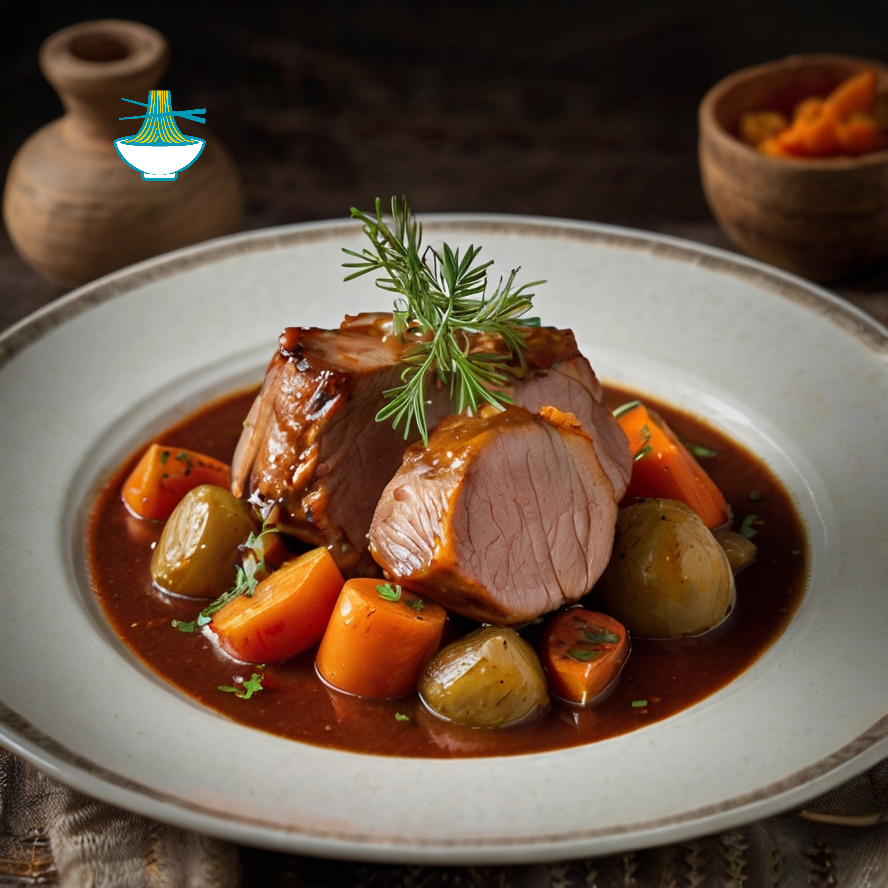Discover the authentic flavors of French cuisine with this Ragoût de Porc, a classic pork stew simmered with tender vegetables and a rich, savory sauce. Perfect for a comforting meal, this traditional recipe brings together succulent pork, carrots, potatoes, and a medley of herbs to create a hearty dish full of warmth and flavor. Easy to prepare and ideal for cozy dinners, this stew is sure to impress your family and guests with its delicious taste and satisfying richness. Try this French pork stew recipe for a taste of rustic culinary tradition.
Ingredients:
- 2 lbs (900g) pork shoulder, cut into cubes
- 2 tbsp olive oil
- 1 onion, chopped
- 3 garlic cloves, minced
- 2 carrots, sliced
- 3 potatoes, diced
- 2 celery stalks, chopped
- 1 bay leaf
- 1 tsp thyme
- 1 cup (240ml) white wine
- 2 cups (480ml) chicken broth
- 2 tbsp tomato paste
- Salt and pepper to taste
- Fresh parsley for garnish
Instructions:
Brown the Pork: In a large pot, heat the olive oil over medium heat. Add the pork cubes and brown on all sides. Remove the pork and set aside.
Cook the Vegetables: In the same pot, add the chopped onion, garlic, carrots, celery, and potatoes. Sauté until the vegetables begin to soften, about 5 minutes.
Add the Liquid: Stir in the tomato paste, then pour in the white wine, scraping the bottom of the pot to deglaze. Allow the wine to reduce for 2-3 minutes.
Simmer the Stew: Return the pork to the pot, add the bay leaf, thyme, chicken broth, salt, and pepper. Bring to a boil, then reduce the heat to low and cover. Simmer for 1.5 to 2 hours, or until the pork is tender and the sauce has thickened.
Serve: Garnish with fresh parsley and serve hot with crusty bread or over rice.
Enjoy your comforting and flavorful Ragoût de Porc!
Nutritional Values
Pork Shoulder
- Calories: 225
- Protein: 22g
- Fat: 15g
- Carbohydrates: 0g
- Vitamins & Minerals: High in B vitamins (especially B12 and niacin), phosphorus, and zinc.
Benefits: Pork shoulder is a good source of high-quality protein and essential vitamins and minerals that support energy production, muscle health, and immune function.
Olive Oil
- Calories: 120
- Fat: 14g (of which 2g are saturated, 11g are monounsaturated, and 1g are polyunsaturated)
- Carbohydrates: 0g
- Vitamins & Minerals: Contains vitamin E and K.
Benefits: Olive oil is rich in monounsaturated fats, which are heart-healthy and can help reduce inflammation. It also contains antioxidants that support overall health.
Onion
- Calories: 44
- Protein: 1g
- Fat: 0g
- Carbohydrates: 10g
- Vitamins & Minerals: Good source of vitamin C, vitamin B6, and manganese.
Benefits: Onions contain antioxidants and anti-inflammatory compounds that support heart health and may help regulate blood sugar levels.
Garlic
- Calories: 5
- Protein: 0g
- Fat: 0g
- Carbohydrates: 1g
- Vitamins & Minerals: Contains small amounts of vitamins B6 and C, and manganese.
Benefits: Garlic has antimicrobial and anti-inflammatory properties and can help boost the immune system and improve heart health.
Carrots
- Calories: 25
- Protein: 1g
- Fat: 0g
- Carbohydrates: 6g
- Vitamins & Minerals: Excellent source of vitamin A, vitamin K, and potassium.
Benefits: Carrots are high in beta-carotene, which is converted to vitamin A, essential for vision health, immune function, and skin health.
Potatoes
- Calories: 110
- Protein: 3g
- Fat: 0g
- Carbohydrates: 26g
- Vitamins & Minerals: Good source of vitamin C, vitamin B6, and potassium.
Benefits: Potatoes provide energy through their carbohydrate content and are rich in potassium, which supports heart health and muscle function.
Celery
- Calories: 6
- Protein: 0g
- Fat: 0g
- Carbohydrates: 1g
- Vitamins & Minerals: Contains vitamin K, vitamin C, and potassium.
Benefits: Celery is low in calories and high in fiber, which aids in digestion and supports overall health.
Bay Leaf
- Calories: 1
- Protein: 0g
- Fat: 0g
- Carbohydrates: 0g
- Vitamins & Minerals: Contains small amounts of vitamin A and vitamin C.
Benefits: Bay leaves contain antioxidants and compounds that may aid digestion and support overall health.
Thyme
- Calories: 3
- Protein: 0g
- Fat: 0g
- Carbohydrates: 1g
- Vitamins & Minerals: Rich in vitamin C, vitamin A, and manganese.
Benefits: Thyme has antimicrobial and antioxidant properties and can support respiratory health and digestion.
White Wine
- Calories: 120
- Protein: 0g
- Fat: 0g
- Carbohydrates: 4g (mainly from sugars)
- Vitamins & Minerals: Contains small amounts of various vitamins and minerals.
Benefits: White wine adds flavor and depth to dishes. The alcohol cooks off, but it can contribute a subtle richness to the stew.
Chicken Broth
- Calories: 10
- Protein: 1g
- Fat: 0g
- Carbohydrates: 1g
- Vitamins & Minerals: Contains small amounts of various vitamins and minerals.
Benefits: Chicken broth adds flavor and nutrients to the stew. It can also be a source of collagen, which supports joint health.
Tomato Paste
- Calories: 30
- Protein: 1g
- Fat: 0g
- Carbohydrates: 7g
- Vitamins & Minerals: Good source of vitamin C and potassium.
Benefits: Tomato paste is concentrated in lycopene, an antioxidant that supports heart health and may reduce the risk of certain cancers.
Salt and Pepper
- Salt: High in sodium. Use in moderation to avoid excessive sodium intake.
- Pepper: Negligible calories and nutrients but adds flavor.
Benefits: Salt enhances flavor but should be used sparingly. Pepper contains antioxidants and may aid digestion.
Note: The nutritional values provided are approximate and can vary based on specific ingredient brands and preparation methods.


Comments